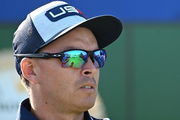

Problems keep mounting for Surinamese sprinter Issam Asinga, whose once-glittering career has hit a devastating standstill. In 2023, he was on top of the track world — crowned Gatorade’s National Boys Track and Field Player of the Year in Los Angeles after a sensational 9.89-second sprint in the 100m, setting a new under-20 world record and nearly matching Noah Lyles. But 2024 delivered a harsh blow. Asinga tested positive for Cardarine, a banned substance, prompting the Athletics Integrity Unit (AIU) to hand him a four-year suspension. He maintained his innocence, claiming his positive test stemmed from contaminated Gatorade gummies, but that defense has failed to gain traction.
Watch What’s Trending Now!
Now, the Court of Arbitration for Sport (CAS) has officially dismissed Issam Asinga’s appeal. The ruling confirmed that he tested positive for GW1516 metabolites during an out-of-competition test on July 18, 2023, and that he was unable to prove — even on the balance of probabilities — that the Gatorade gummies were contaminated. The panel further found that he could not demonstrate his violation was unintentional.
As a result, Asinga’s four-year ban, which began on May 6, 2024, will remain in place until 2028, cutting off some of the most crucial years of his prime and casting a long shadow over his future in athletics. The court stated: “Therefore, a reduced sanction for No Fault or Negligence was not applicable. The panel also found that the athlete failed to establish that his (anti-doping rule violation) was not intentional.”
ADVERTISEMENT
The Court of Arbitration for Sport has dismissed an appeal by Suriname sprinter Issam Asinga regarding his positive test for metabolites of GW1516—a banned substance—during an out-of-competition test on 18 July 2023.
Asinga claimed the positive result stemmed from Gatorade… pic.twitter.com/40tEsneqfq
— CITIUS MAG (@CitiusMag) October 30, 2025
When Asinga was charged with the accusations, he explained that his positive test stemmed from Gatorade’s “recovery gummies,” gifted to him at the award ceremony. As per his claims, the gummies were tainted with Cardarine and falsely labelled “certified for sport” by NSF, the body that ensures supplements are free of banned substances. With the hubbub, now the case hinged on the sealed bottle for proof, but Asinga no longer had possession of it. Now, he had two choices: accept the decision or challenge the CAS proceedings. He took a rather different approach.
When first charged, Asinga explained that his positive result came from Gatorade’s recovery gummies, gifted to him at the award ceremony. He alleged that the gummies were tainted with Cardarine and falsely labeled “certified for sport” by NSF — the body responsible for ensuring supplements are free from banned substances. The controversy soon centered on one crucial piece of evidence: the sealed bottle of gummies. Unfortunately, Asinga no longer had it in his possession, leaving him at a crossroads — to accept the ruling or challenge the CAS decision. He chose to fight back.
ADVERTISEMENT
Issam Asinga appointed attorney Paul J. Greene to represent him before CAS. The dispute focused on two unsealed containers of Gatorade Recovery Gummies collected from Asinga. Reports indicated traces of GW1516 sulfone and GW1516 sulfoxide — both prohibited under WADA regulations. You’d think that might work in his favor. But it didn’t. Tests showed that the banned compounds were concentrated on the surface of the gummies rather than throughout, raising doubts about contamination claims.
To make matters worse, the ingredients used in Gatorade Recovery Gummies are certified by NSF for Sport, and tests conducted at the Lausanne anti-doping lab on a sealed jar from the same batch came back negative. That result sealed Asinga’s fate — confirming his four-year suspension. Interestingly, the case draws a parallel with another sprinting controversy from a decade ago.
ADVERTISEMENT
Top Stories
Scottie Scheffler Faces Scrutiny After Taking Out Anger on Golf Club at WM Phoenix Open: ‘Washed’

Jordan Spieth Throws Bizarre Temper Tantrum as Opening Round at WM Phoenix Open Becomes a Challenge

Rob Gronkowski Demands Severe Punishment for Andy Reid After Bill Belichick Snub

PGA Tour Split Into Two as Scottie Scheffler Confirms Stance on Patrick Reed’s Return

Drake Maye Reveals Shoulder Injury Update as Patriots QB Announces News On Super Bowl Availability

Rickie Fowler Fans Demand Answers Following ESPN’s Controversial WM Phoenix Open Decision

The Asafa Powell episode repeated itself years later with Issam Asinga.
The Asafa Powell episode seems to have resurfaced — this time in Issam Asinga’s story. Back then, Jamaican legend Asafa Powell faced a similar nightmare, receiving an 18-month ban after testing positive for oxilofrine, a substance banned under WADA rules. His training partner, Sherone Simpson, suffered the same outcome. Both insisted the violation was unintentional, pointing to contamination from a supplement called Epiphany D1, which was later confirmed to contain the banned ingredient despite it not being listed on the label or website.
Powell defended his case, stating, “My team commissioned two private laboratories that confirmed that oxilofrine was present in the supplements, despite it not being listed as an ingredient on the bottle nor on its website.”
ADVERTISEMENT
That controversy ultimately ended in Powell and Simpson’s favor after the athletes sued the supplement company and settled out of court. But for Issam Asinga, there seems to be no such reprieve. His four-year ban stands firm — a crushing verdict for a young sprinter once destined for greatness.
ADVERTISEMENT
ADVERTISEMENT
ADVERTISEMENT